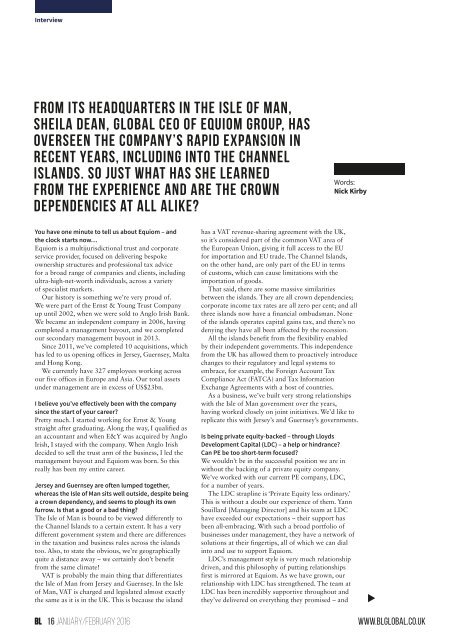BL Magazine
Create successful ePaper yourself
Turn your PDF publications into a flip-book with our unique Google optimized e-Paper software.
Interview<br />
From its headquarters in the Isle of Man,<br />
Sheila Dean, Global CEO of Equiom Group, has<br />
overseen the company’s rapid expansion in<br />
recent years, including into the Channel<br />
Islands. So just what has she learned<br />
from the experience and are the crown<br />
dependencies at all alike?<br />
Words:<br />
Nick Kirby<br />
You have one minute to tell us about Equiom – and<br />
the clock starts now…<br />
Equiom is a multijurisdictional trust and corporate<br />
service provider, focused on delivering bespoke<br />
ownership structures and professional tax advice<br />
for a broad range of companies and clients, including<br />
ultra-high-net-worth individuals, across a variety<br />
of specialist markets.<br />
Our history is something we’re very proud of.<br />
We were part of the Ernst & Young Trust Company<br />
up until 2002, when we were sold to Anglo Irish Bank.<br />
We became an independent company in 2006, having<br />
completed a management buyout, and we completed<br />
our secondary management buyout in 2013.<br />
Since 2011, we’ve completed 10 acquisitions, which<br />
has led to us opening offices in Jersey, Guernsey, Malta<br />
and Hong Kong.<br />
We currently have 327 employees working across<br />
our five offices in Europe and Asia. Our total assets<br />
under management are in excess of US$23bn.<br />
I believe you’ve effectively been with the company<br />
since the start of your career?<br />
Pretty much. I started working for Ernst & Young<br />
straight after graduating. Along the way, I qualified as<br />
an accountant and when E&Y was acquired by Anglo<br />
Irish, I stayed with the company. When Anglo Irish<br />
decided to sell the trust arm of the business, I led the<br />
management buyout and Equiom was born. So this<br />
really has been my entire career.<br />
Jersey and Guernsey are often lumped together,<br />
whereas the Isle of Man sits well outside, despite being<br />
a crown dependency, and seems to plough its own<br />
furrow. Is that a good or a bad thing?<br />
The Isle of Man is bound to be viewed differently to<br />
the Channel Islands to a certain extent. It has a very<br />
different government system and there are differences<br />
in the taxation and business rules across the islands<br />
too. Also, to state the obvious, we’re geographically<br />
quite a distance away – we certainly don’t benefit<br />
from the same climate!<br />
VAT is probably the main thing that differentiates<br />
the Isle of Man from Jersey and Guernsey. In the Isle<br />
of Man, VAT is charged and legislated almost exactly<br />
the same as it is in the UK. This is because the island<br />
has a VAT revenue-sharing agreement with the UK,<br />
so it’s considered part of the common VAT area of<br />
the European Union, giving it full access to the EU<br />
for importation and EU trade. The Channel Islands,<br />
on the other hand, are only part of the EU in terms<br />
of customs, which can cause limitations with the<br />
importation of goods.<br />
That said, there are some massive similarities<br />
between the islands. They are all crown dependencies;<br />
corporate income tax rates are all zero per cent; and all<br />
three islands now have a financial ombudsman. None<br />
of the islands operates capital gains tax, and there’s no<br />
denying they have all been affected by the recession.<br />
All the islands benefit from the flexibility enabled<br />
by their independent governments. This independence<br />
from the UK has allowed them to proactively introduce<br />
changes to their regulatory and legal systems to<br />
embrace, for example, the Foreign Account Tax<br />
Compliance Act (FATCA) and Tax Information<br />
Exchange Agreements with a host of countries.<br />
As a business, we’ve built very strong relationships<br />
with the Isle of Man government over the years,<br />
having worked closely on joint initiatives. We’d like to<br />
replicate this with Jersey’s and Guernsey’s governments.<br />
Is being private equity-backed – through Lloyds<br />
Development Capital (LDC) – a help or hindrance?<br />
Can PE be too short-term focused?<br />
We wouldn’t be in the successful position we are in<br />
without the backing of a private equity company.<br />
We’ve worked with our current PE company, LDC,<br />
for a number of years.<br />
The LDC strapline is ‘Private Equity less ordinary.’<br />
This is without a doubt our experience of them. Yann<br />
Souillard [Managing Director] and his team at LDC<br />
have exceeded our expectations – their support has<br />
been all-embracing. With such a broad portfolio of<br />
businesses under management, they have a network of<br />
solutions at their fingertips, all of which we can dial<br />
into and use to support Equiom.<br />
LDC’s management style is very much relationship<br />
driven, and this philosophy of putting relationships<br />
first is mirrored at Equiom. As we have grown, our<br />
relationship with LDC has strengthened. The team at<br />
LDC has been incredibly supportive throughout and<br />
they’ve delivered on everything they promised – and<br />
▼<br />
16 January/february 2016 www.blglobal.co.uk

















